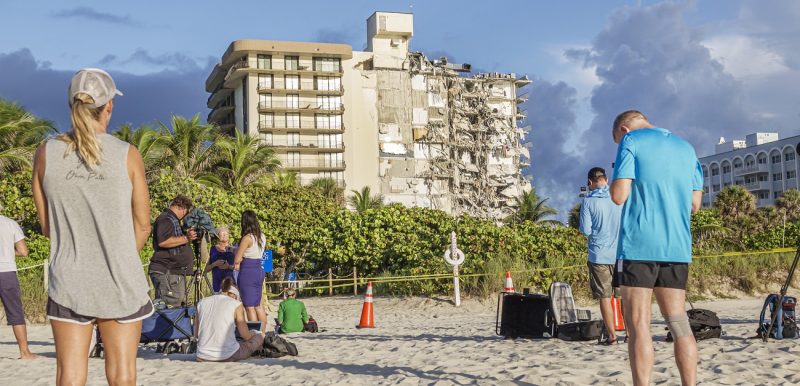Buildings older than 40 are being scrutinized throughout the country as investigators in Surfside, Fla., continue searching for clues that can explain why a 12-story condo building collapsed in the middle of the night last week. As of Tuesday morning, 11 people were dead and 150 were missing in a tragedy that has shaken property owners nationwide.
The collapse of Champlain Towers South also has sparked a debate over whether Miami’s 40-year recertification process for building safety standards is enough. Champlain Towers South, an oceanfront property built in 1981, was in the recertification process required by Miami-Dade and Broward counties when it fell last week. The event has prompted Florida—which has some of the most stringent building codes in the country—and other states to reevaluate their construction protocols.
Miami-Dade County Mayor Daniella Levine Cava has ordered a 30-day audit of residential properties five stories and taller that are due for the 40-year recertification. Cava's office has identified 469 multifamily and condo properties that have either failed to submit recertification reports to the county or have not repaired problems found, The Real Deal reports. Miami-Dade County also is examining 318 properties that are in some stage of the recertification process.
Experts, however, are realizing that may not be enough to protect buildings. U.S. Rep. Debbie Wasserman Schultz (D-Fla.) vowed in a press conference Monday to look at “how we change federal law relating to building inspections” to prevent future collapses.
Real estate pro Eric Maribojoc, also executive director of the Center for Real Estate Entrepreneurship at George Mason University's School of Business, predicts technology will be key in accelerating what likely will become a growing interest over inspections of buildings over 40 years old following the condo's collapse. The structural condition of buildings likely will become a greater focus for owners, insurers, lenders, and public agencies. Mairbojoc predicts an increased interest in emerging technologies like in robotics, building materials, image scanning, and digital modeling to aid in building inspections moving forward.
Also, inspections likely will widen and not just be based on a building’s age. Attorney Carolina Sznajderman Sheir, a partner at Eisinger Law, told The Real Deal that buildings today are faced with more issues that should lead to further scrutiny and reviews. “There’s much higher density,” she says. “The buildings are higher, bigger. There’s climate change. We’re dealing with erosion. Just because a 40-year recertification is [required] does not mean you should not be doing regular inspections of a building. Right now, a lot of people are nervous. This is a good wake-up call for people reluctant to do repairs.”
Source: “County, Cities Rush to Inspect Older Buildings in Wake of Surfside Collapse,” The Real Deal (June 28, 2021) and “After Surfside Collapse, Miami-Dade Governments Check on Older Buildings, Discuss Reform,” Miami Herald (June 28, 2021)













